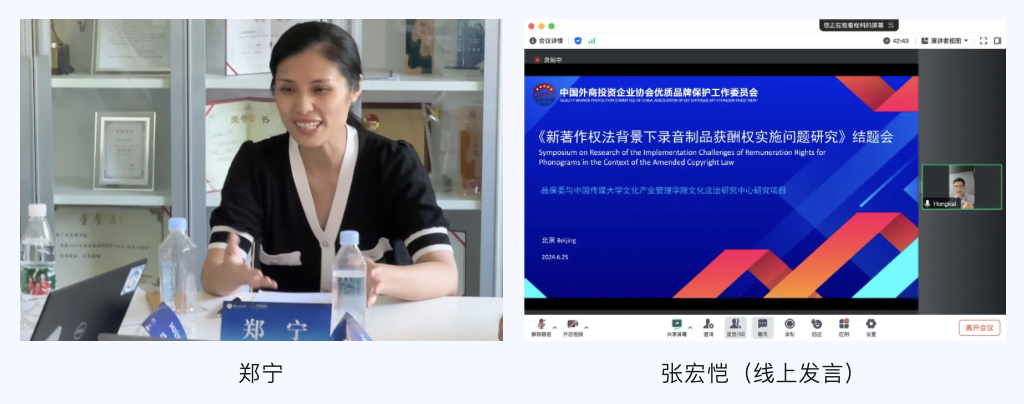The newly-added Article 45 in the amended Copyright Law, which came into force in June 2021, granted phonogram producers the right to be remunerated when their sound recordings were disseminated or broadcast to the public. However, the enforcement of such right under mechanical performances remains doubtful in practice, which has brought greater uncertainty to the production and business activities of QBPC members and other relevant market players.
To help QBPC members better respond to relevant issues, reflect industry demand, and promote a smoother and more reasonable implementation of Article 45 of the amended Copyright Law, the Quality Brands Protection Committee of China Association of Enterprises with Foreign Investment (QBPC) Best Practices/Enforcement Committee (BPEC) has entrusted the Center for Cultural Law of School of Culture Industries Management of Communication University of China to conduct an in-depth research on the relevant topics. A concluding seminar on Research over Enforcing Remuneration Rights for Phonograms in the Context of the Amended Copyright Law on was held in Beijing on June 25. The research team members discussed the research report and various theoretical and practical problems in the application of Article 45 as well as answering the questions from members. Over 30 QBPC members attended the seminar on site or online.

First, ZHENG Ning, Director and Professor of Law Department and the Center for Cultural Law of the School of Culture Industries Management at Communication University of China, and ZHANG Hongkai, BPEC Vice Chair, made the opening remarks. Ning noted that some contentious issues arising from remuneration right enforcement for sound recordings under mechanical performances were of great value for research and discussion. He hoped that a final report would be formed based on the basic consensus reached at opening seminar and further in-depth discussions with QBPC members. Next, after briefly introducing the background of research, Hongkai said that the enforcement of remuneration right for sound recordings had inevitably encountered confusions and challenges. In order to better understand and apply Article 45, a consensus must be forged. He expected this research could enable members to better understand the construction of the system of the right under mechanical performance, promote benign interactions among right holders, users and collective management organizations, and provide useful compliance references for member companies using musical works, and also provide academic support for the smooth implementation of the relevant rules of the amended Copyright Law.
Then, CHENG Ke, Deputy Director and Associate Professor of the Center for Cultural Law of the School of Culture Industries Management at Communication University of China, introduced the legislative background, systematic application, and implementation path of Article 45 of the Copyright Law, which included the legal nature, application scope, relationship with international treaties, implementation mechanism, and other important issues related to “the remuneration right for phonogram producers”. Ke pointed out that the system of “mandatory extended management” by copyright collective management organizations lacked sufficient rationality and legal basis at present and that judicial adjudication of individual cases was not the best way to establish fee standards. The establishment of a reasonable remuneration mechanism for sound recordings required the collaborative efforts of right holders, users, and the public. Through the introduction of new technologies, there should be active exploration on a rate mechanism based on the actual volume of playback. Furthermoe, it could be dynamically adjusted according to the scale of different enterprises and usage scenarios, resulting in a reduction of the cost of rights searching and transactions, stimulating the creativity and vitality of the music market, and promoting a win-win situation for both right holders and users.
Afterwards, LIU Wenjie, Professor of College of Comparative Law at the China University of Political Science and Law, elaborated on the characteristics, the application scenarios, the implementation mode and path of the right under the Copyright Law in practice through providing numerous case studies. He also expressed his views and made pertinent recommendations regarding the remuneration rate, and how to balance the interests among the right holders, the copyright collective management organizations, and the users, which provided good references for the research.
In the Q&A session, the research team responded to the questions raised by the participants, such as how the industries were affected by the legislation and landing of Article 45, the necessity of the protection of public works and legislative hearings, the future development trend of collective management organizations and copyright issues, and the fees for live broadcasting rooms, etc.
